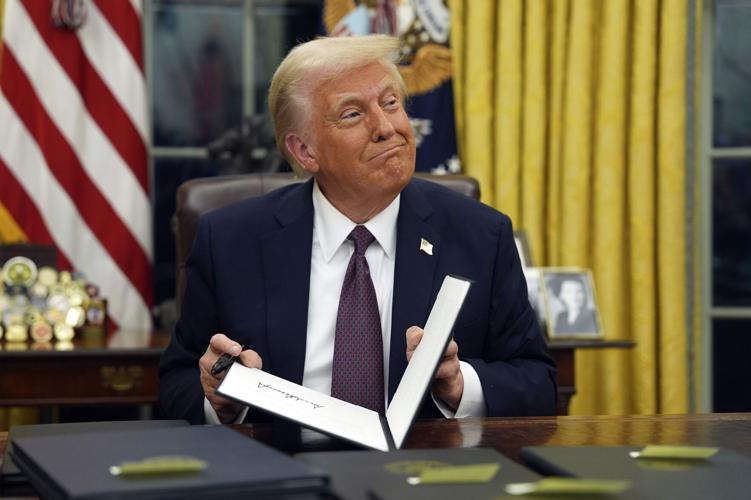Call it the 911 presidency.
Despite insisting that the United States is rebounding from calamity under his watch, President Donald Trump is harnessing emergency powers unlike any of his predecessors.

President Donald Trump signs executive orders Jan. 20 in the Oval Office of the White House.
Whether it’s leveling punishing tariffs, deploying troops to the border or sidelining environmental regulations, Trump has relied on rules and laws intended only for use in extraordinary circumstances like war and invasion.
An analysis by The Associated Press shows that 30 of Trump’s 150 executive orders have cited an emergency power or authority, a rate that far outpaces his recent predecessors.
The result is a redefinition of how presidents can wield power. Instead of responding to an unforeseen crisis, Trump is using emergency powers to supplant Congress’ authority and advance his agenda.
People are also reading…
“What’s notable about Trump is the enormous scale and extent, which is greater than under any modern president,” said Ilya Somin, who is representing five U.S. businesses who sued the administration, claiming they were harmed by Trump’s so-called “Liberation Day” tariffs.
Because Congress has the power to set trade policy under the Constitution, the businesses convinced a federal trade court that Trump overstepped his authority by claiming an economic emergency to impose the tariffs. An appeals court paused that ruling while the judges review it.
Growing concerns over actions
The legal battle is a reminder of the potential risks of Trump’s strategy. Judges traditionally have given presidents wide latitude to exercise emergency powers that were created by Congress. However, there’s growing concern that Trump is pressing the limits when the U.S. is not facing the kinds of threats such actions are meant to address.
“The temptation is clear,” said Elizabeth Goitein, senior director of the Brennan Center’s Liberty and National Security Program and an expert in emergency powers. “What’s remarkable is how little abuse there was before, but we’re in a different era now.”
Rep. Don Bacon, R-Neb., who drafted legislation that would allow Congress to reassert tariff authority, said he believed the courts would ultimately rule against Trump in his efforts to single-handedly shape trade policy.
“It’s the Constitution. James Madison wrote it that way, and it was very explicit,” Bacon said of Congress’ power over trade.
The White House pushed back on such concerns, saying Trump is justified in aggressively using his authority.
“President Trump is rightfully enlisting his emergency powers to quickly rectify four years of failure and fix the many catastrophes he inherited from Joe Biden — wide open borders, wars in Ukraine and Gaza, radical climate regulations, historic inflation, and economic and national security threats posed by trade deficits,” White House press secretary Karoline Leavitt said.
Trump frequently cites 1977 law
Of all the emergency powers, Trump has most frequently cited the International Emergency Economic Powers Act, or IEEPA, to justify slapping tariffs on imports.
The law, enacted in 1977, was intended to limit some of the expansive authority that had been granted to the presidency decades earlier.Â
In analyzing executive orders issued since 2001, the AP found that Trump invoked the law 21 times in presidential orders and memoranda. President George W. Bush, grappling with the aftermath of the most devastating terror attack on U.S. soil, invoked the law 14 times in his first term. Likewise, Barack Obama invoked the act 21 times during his first term, when the U.S. economy faced the worst economic collapse since the Great Depression.
The Trump administration has also deployed an 18th century law, the Alien Enemies Act, to justify deporting Venezuelan migrants to other countries, including El Salvador. Trump's decision to invoke the law relies on allegations that the Venezuelan government coordinates with the Tren de Aragua gang, but intelligence officials did not reach that conclusion.

President Donald Trump signs executive orders in the Oval Office of the White House, Jan. 20, in Washington.
Congress ceded its power to the presidency
Congress has granted emergency powers to the presidency over the years, acknowledging that the executive branch can act more swiftly than lawmakers if there is a crisis. There are 150 legal powers — including waiving a wide variety of actions that gress has broadly prohibited — that can be accessed only after declaring an emergency.Â
Democrats and Republicans have pushed the boundaries over the years. For example, in an attempt to cancel federal student loan debt, Joe Biden used a post-Sept. 11 law that empowered education secretaries to reduce or eliminate such obligations during a national emergency. The U.S. Supreme Court rejected his effort.
Before that, Bush pursued warrantless domestic wiretapping and Franklin D. Roosevelt ordered the detention of Japanese-Americans on the West Coast in camps for the duration of World War II.
“Presidents are using these emergency powers not to respond quickly to unanticipated challenges,” said John Yoo, who as a Justice Department official under George W. Bush helped expand the use of presidential authorities. “Presidents are using it to step into a political gap because Congress chooses not to act.”
Trump, Yoo said, “has just elevated it to another level.”

















